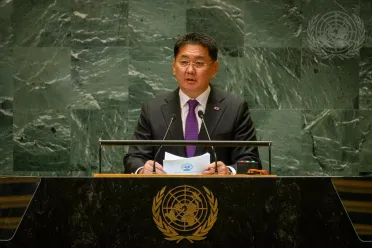Statement
Statement summary
KHURELSUKH UKHNAA, President of Mongolia, voiced concern that only 35 per cent of the Sustainable Development Goals (SDGs) have been achieved. While the Summit of the Future provided a forum for discussions on science, technology and governance transformation, the implementation of its outcomes is urgent. To sustain peace, combat climate change, reduce inequality and establish justice, the international community must innovate, he said. Mongolia respects the pluralism and diverse histories, religions and development paths of all Member States, he underscored, adding that his country’s foreign policy prohibits acting against a State’s territorial integrity or stripping its political independence by force.
Meanwhile, deepening geopolitical tensions and the threat of nuclear war loom. Reaffirming a commitment to supporting nuclear-weapon-free policies, he called on the Assembly “to collaborate in ensuring peace and stability, particularly in creating a world free from nuclear threats”. In that same vein of international peace and security, he hailed the role of UN peacekeepers, lamenting the 4,730 who have lost their lives in the line of duty. Though home to a small population, Mongolia has contributed 20,000 peacekeepers over the past 20 years. In line with the women, peace and security agenda, the country aims to increase women’s participation in peacekeeping operations, he said, citing the Mongolian-led “Pilot Project for Supporting Peacekeepers and their Families” and calling for its support.
Turning to new technologies, he hailed the adoption of the Global Digital Compact as an essential step. Mongolia aims to keep pace with a rapidly developing landscape, yet while countries around the world harness the power of technology to address the SDGs, global debt accumulation has reached unprecedented levels, hampering progress. To that end, he voiced support for debt sustainability and reform of the international financial architecture in line with Our Common Agenda. Next, sounding the alarm over a dangerous mix of “traditional military threats” and “non-traditional threats” including climate change, pandemics and cybercrime, which force migration and strain resources, he called for strengthened unity. “Humanity will face not just a choice between development or stagnation, but rather a choice between existence and non-existence.” Mongolia has wisdom to offer on the subject from its origins as a nomadic civilization, itself “a philosophy of green development, which emphasizes caring for and protecting nature while responsibly utilizing its benefits”, which informs its current development policy, he said.
Moreover, his country and Austria co-chaired the Third United Nations Conference on Landlocked Developing Countries, producing a draft programme of action to be adopted at the upcoming conference in Botswana, he said, urging other landlocked developing countries and transit countries to cooperate on its successful implementation. Turning attention to gender equality, he noted that implemented policy reforms to enhance women’s participation in Mongolia have delivered a positive result following the parliamentary elections this year: “25.4 per cent of all elected members were women, exceeding the average rate of 21.2 per cent in Asia.” Further, Mongolia hosted the 2024 World Women’s Forum under the theme “Towards a Green Future” in Ulaanbaatar. Finally, voicing support for Member States’ efforts to reform the Security Council, he reaffirmed the importance of the UN’s central role in global affairs, calling on the Assembly to pursue peace and the “well-being of humanity”.
Full statement
Read the full statement, in PDF format.
Photo

Previous sessions
Access the statements from previous sessions.
